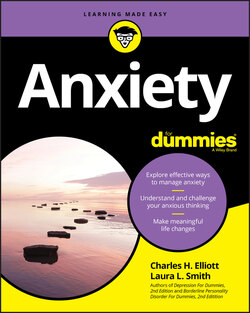Читать книгу Anxiety For Dummies - W. Doyle Gentry, Laura L. Smith - Страница 33
Worrywarts
ОглавлениеMost people have heard of the term “worrywart” and immediately conjure up someone who constantly worries. Worrywarts have a chronic state of tension and worry. They often report feeling restless, on edge, and keyed up. They may tire easily and have trouble concentrating or falling asleep. Once asleep, they may wake up at 3 a.m. with racing, worried thoughts. Worriers also often report having achy muscles, especially in the back, shoulders, or neck.
Not everyone experiences chronic worries in exactly the same way. Some worriers complain about other problems — such as twitching, trembling, shortness of breath, sweating, dry mouth, stomach upset, feeling shaky, being easily startled, and having difficulty swallowing. No matter how you experience worry, if it’s keeping you from living life the way you want to, it’s a problem.
The following profile offers an example of what excessive worry looks like.
In a subway, Brian taps his foot nervously. He slept only a few hours last night, tossing, turning, and ruminating about the economy. He’s sure that he’s next in line to lose his job. Even though his boss says that he’s safe, Brian can’t stop worrying. He believes that he may end up broke and homeless.
His back is killing him; he shrugs his shoulders trying to loosen up his tight muscles. He struggles to concentrate on the blog that he’s looking at and realizes that he can’t remember what he just read. He notices his shirt feels damp. He thinks he might be sick. He is sick — with worry.
Brian has worked steadily at the same company since graduating from college six years ago. His work is highly technical. Most of the senior executives depend on his technology know-how. He has stashed away a nice amount of money for emergencies. Nevertheless, his anxiety has increased over the last year to the point that he notices that he’s making mistakes. He can’t think; he feels horrible and is in a constant state of distress.
The economy can make anyone anxious at times. But Brian’s worries appear to be out of proportion to his real situation. It seems unlikely that he’s in danger of losing his job. However, his extreme anxiety may, in fact, cause him to get in trouble at work. People with overwhelming anxiety often make careless mistakes because of problems with attention and concentration.
Some worries are perfectly normal. If you lose your job, it’s quite natural to worry about money. But if your name is Bill Gates or Jeff Bezos and you’re worried about money, perhaps you have a problem with anxiety.
When we were writing this section, we wondered where the original phrase “worrywart” came from. So, we looked it up. Turns out that Worry Wart was a character in a comic strip from the 1920s. The boy was a constant pest and annoyed his brother who christened him with the name Worry Wart. The meaning evolved into someone who is constantly beset with worries. The reason the word “wart” was used is that warts are an itchy nuisance that can’t be scratched away. In fact, the more you scratch, the worse the wart becomes, a bit like worry.
